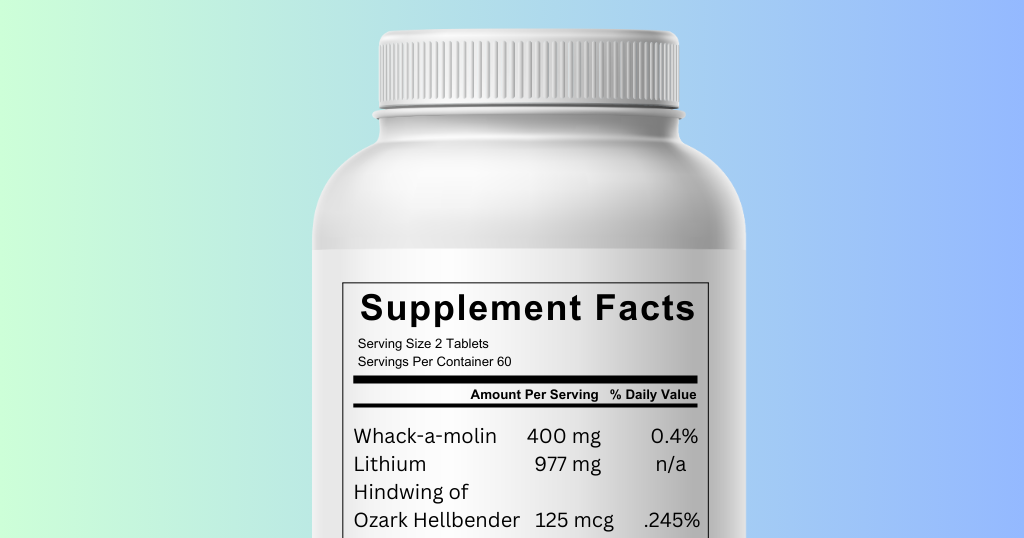Don’t follow my example.
When I can remember them, I’ll indicate the dosages I used on a particular self-experiment, but that does not mean they are appropriate for someone else.
Requirements will vary with weight, extent of the deficiency, diet, other supplementation, gender, sensitivity and other concurrent deficiencies. For example, I can’t handle amino acid supplements at all. But I can take 15,000 mg of vitamin C for months and never notice any ill effects, where other ladies would collapse in the powder room after three days.
When I’m trying to figure out how much of substance X to take after I’ve decided that it might be the cure to all my ills, I google the bejesus out of it and refer to the small selection of books I have that do not completely wimp out when it comes to dosage recommendations. As I have touched on elsewhere, RDAs are 1) for healthy people, NOT for correcting deficiencies, and 2) not particularly well thought-out to begin with. The majority of nutritional reference guides out there are pretty conservative and confuse the concepts of maintenance dosages (preventing deficiency) and therapeutic dosages (correcting deficiency and the nasty conditions that accompany it).
Keith Richards is my co-pilot
I lost my fear of megadoses long ago, and I continue to follow the guidance that Needleman the acupuncturist gave me years ago in terms of self-experimenting: do what you can and don’t let it stress you out too much. To that end, I would occasionally down the daily pill regimen with a shot of whiskey, just to keep things in the proper perspective.
Here are a few sites I consult when I’m researching dosages
- Acu-cell.com: From what I can tell, the information Ronald Roth has on his site reflects his experience treating real, live people in his practice. His symptoms lists are pretty anemic, but his lists of antagonists and synergists for each nutrient (e.g., vitamin A competes with vitamin E) and therapeutic dosage ranges have been very helpful for me. I’ve rarely approached the high end of his therapeutic ranges, except for iodine.
- Individual accounts, such as found on personal sites and online forums or other “groups”: When you read accounts of individuals’ experiences with supplements you can get an idea of what they’re basing their calculations on, how much like you they are, and of course what actually happened after they took it. There are some articulate, observant experimenters out there, but it takes a bit of doing to find them. I’m assuming I don’t need to tell you to use your usual social antennae to feel out from their entries/comments/posts how intelligent/logical/stupid/irrational/batshit they are.
- The Micronutrient Information Center at the Linus Pauling Institute at Oregon State University. LPI nutrient entries often include info on how the UL, or tolerable upper intake level, was arrived at — the highest daily intake of a nutrient that is likely to pose no risks of toxicity for almost all individuals. Obviously people with serious deficiencies will not be affected the same way, but it’s still something I keep in mind when I’m trying to gauge the likelihood that my new nutrient regimen will chelate every molecule of niacin from my body or activate my alien DNA.
Titrate up, they say
Ideally when starting an experiment you should start low and work your way up, or titrate up, as they say. I used to ignore this warning but I’m now more patient and usually start at the lower end of whatever range I decide is for me and increase depending on how I feel.
Other things I take into account when deciding on dosage
- The risk of depleting a cofactor of that nutrient. For example, the amino acid L-glutamine, which, like all amino acids, needs vitamin B6 to work, might drastically lower your B6 levels if you start taking whopping big doses. If you’re worried you don’t have a lot of B6 to spare, you might want to start on the very low end and watch out for B6 deficiency symptoms, while taking a B6 supplement, too. But if you recently spent months taking extra B6, you don’t have to worry so much about it.
- How desperate I am and how patient I am. In theory you should give a new regimen a six-week trial at least. (Of equal importance is seeing how you feel after you stop, but that’s another topic.) But sometimes you’ll be tempted to flood your system with the supplement just for the helluva it, especially if you’ve suffered a long time and have tried a ton of crap. You’re only human.
_______________
This content was first published on September 6, 2011 and updated on October 13, 2011, October 22, 2020, October 10, 2022, and March 21, 2023.

Marjorie R.
Marjorie is the creator of AvoidingRx.com, a record of her and her guest authors’ experiences with non-prescription health solutions. She is a third-generation nutritional-therapy self-experimenter.





